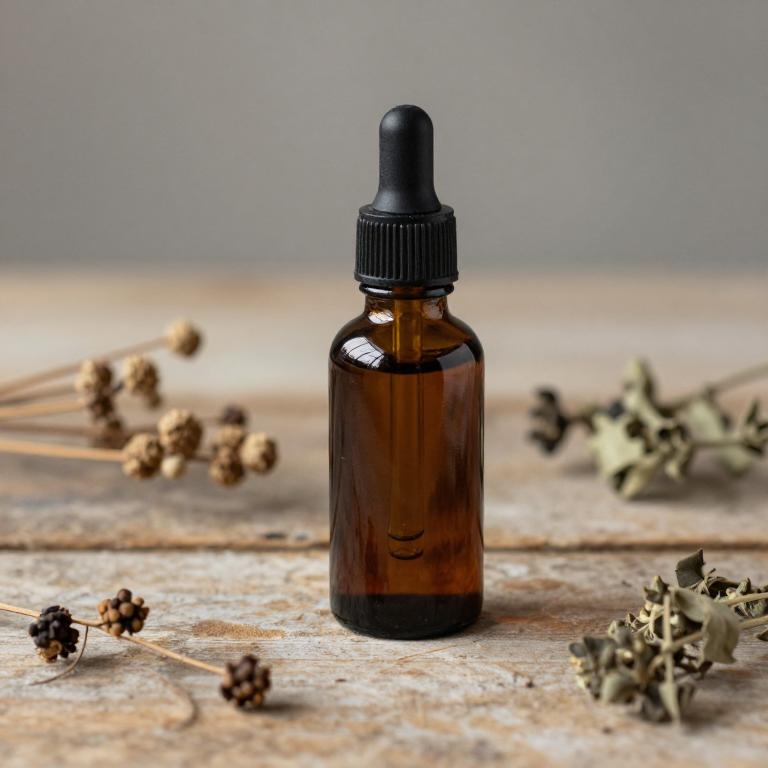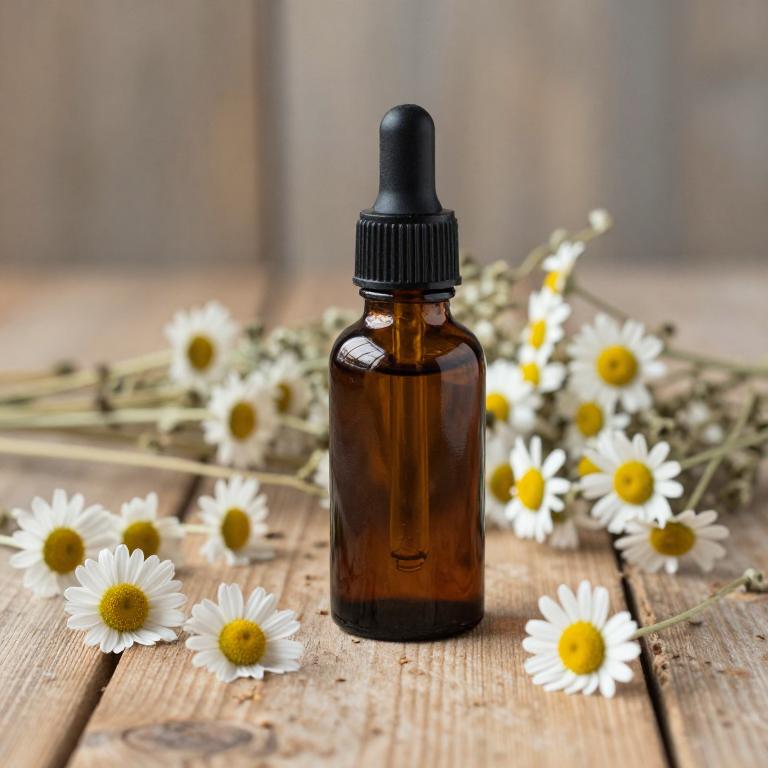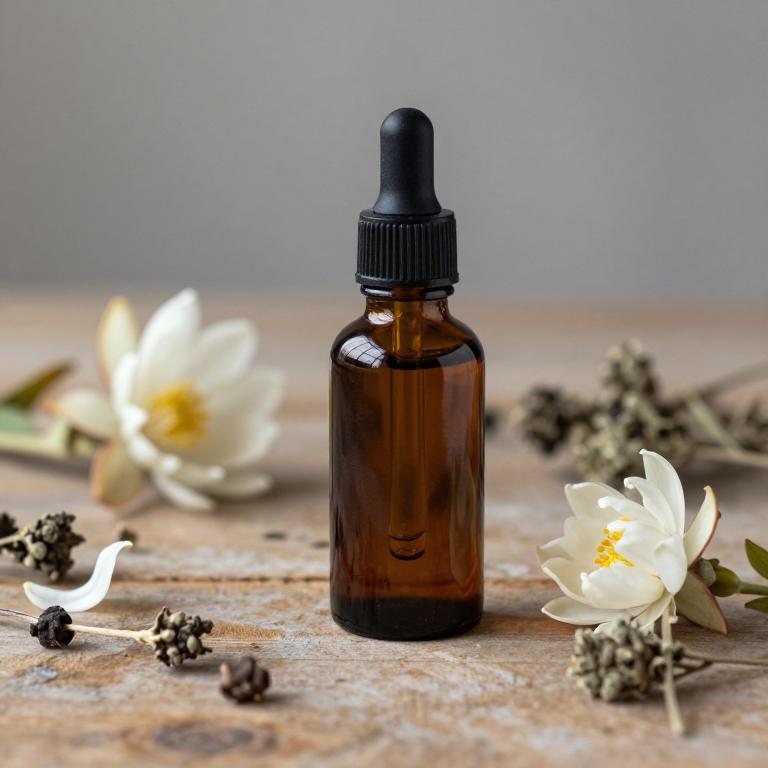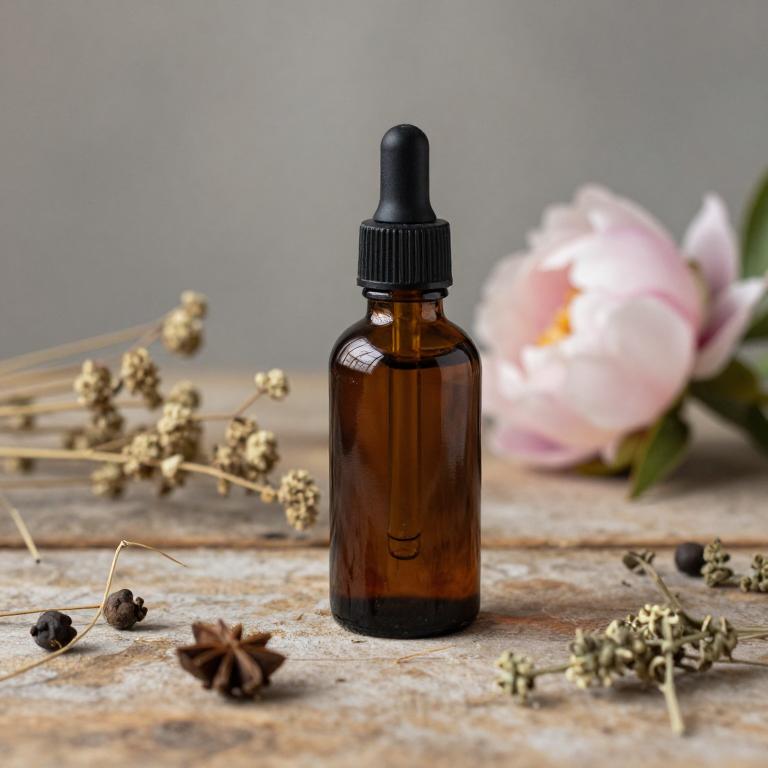10 Best Herbal Tinctures For Period Cramps

Herbal tinctures have become a popular natural remedy for alleviating period cramps due to their ability to provide relief without the side effects often associated with pharmaceutical medications.
Commonly used herbs in these tinctures include cramp bark, ginger, and chamomile, each known for their antispasmodic and anti-inflammatory properties. These tinctures are typically prepared by soaking herbs in alcohol or glycerin, allowing the active compounds to be extracted for easy absorption into the bloodstream. They can be taken orally in small doses during the onset of menstrual cramps to help reduce pain and discomfort.
While generally safe, it is advisable to consult with a healthcare provider before starting any new herbal regimen, especially for those with existing health conditions or who are pregnant.
Table of Contents
- 1. Chaste tree (Vitex agnus-castus)
- 2. Black cohosh (Cimicifuga racemosa)
- 3. Turmeric (Curcuma longa)
- 4. Ginger (Zingiber officinale)
- 5. Stinging nettle (Urtica dioica)
- 6. Fennel (Foeniculum vulgare)
- 7. Chamomile (Matricaria chamomilla)
- 8. White water lily (Nymphaea alba)
- 9. Dog rose (Rosa canina)
- 10. Tree peony (Paeonia suffruticosa)
1. Chaste tree (Vitex agnus-castus)

Vitex agnus-castus, commonly known as chasteberry, is a traditional herbal remedy often used to support women's hormonal health.
Herbal tinctures made from vitex are believed to help regulate menstrual cycles and alleviate symptoms such as period cramps by balancing estrogen and progesterone levels. These tinctures are typically taken in small doses, often 20-40 drops daily, and are best taken with food to minimize stomach upset. While some studies suggest potential benefits, it is important to consult with a healthcare provider before starting any herbal supplement, especially for those with existing medical conditions or who are pregnant.
Vitex agnus-castus tinctures are generally considered safe for most adults but may interact with certain medications or hormonal therapies.
2. Black cohosh (Cimicifuga racemosa)

Cimicifuga racemosa, commonly known as black cohosh, is a herbal remedy often used in the form of a tincture to alleviate symptoms of period cramps.
This plant has been traditionally used in herbal medicine to support women's health, particularly during menstruation and menopause. The tincture is typically made by soaking the dried roots in alcohol, allowing the active compounds to be extracted for use. Studies suggest that it may help reduce menstrual pain by influencing hormone levels and muscle relaxation.
However, it is important to consult with a healthcare provider before use, especially for those with underlying health conditions or who are pregnant.
3. Turmeric (Curcuma longa)

Curcuma longa, commonly known as turmeric, has been traditionally used for its anti-inflammatory and analgesic properties, making it a popular ingredient in herbal tinctures for alleviating period cramps.
These tinctures typically contain a concentrated form of curcumin, the active compound in turmeric, which helps reduce uterine inflammation and muscle spasms associated with menstrual pain. When taken orally, curcuma longa tinctures may support hormonal balance and ease discomfort during menstruation. However, it is important to consult a healthcare professional before use, especially for individuals with existing health conditions or those taking other medications.
Overall, curcuma longa tinctures offer a natural and complementary approach to managing period cramps.
4. Ginger (Zingiber officinale)

Zingiber officinale, commonly known as ginger, has been widely recognized for its medicinal properties, including its ability to alleviate period cramps when used in the form of herbal tinctures.
These tinctures are typically prepared by soaking fresh or dried ginger roots in alcohol, allowing the active compounds such as gingerol and shogaol to be extracted for enhanced bioavailability. The anti-inflammatory and analgesic properties of ginger make it effective in reducing menstrual pain by relaxing uterine muscles and decreasing prostaglandin production. Many women find relief from cramping and discomfort when using ginger tinctures as a natural alternative to over-the-counter pain relievers.
However, it is important to consult with a healthcare provider before use, especially for those with existing health conditions or who are pregnant.
5. Stinging nettle (Urtica dioica)

Urtica dioica, commonly known as stinging nettle, is a potent herb that has been traditionally used to alleviate symptoms of period cramps.
When prepared as a tincture, it offers a concentrated form of the plant's active compounds, which can help reduce inflammation and ease menstrual discomfort. The tincture is typically made by soaking the dried leaves in alcohol, allowing the beneficial compounds to infuse into the liquid. Many women find that taking a small dose of Urtica dioica tincture before their period can help reduce pain and bloating.
It is important to consult with a healthcare provider before using this tincture, especially if you have any underlying health conditions or are taking other medications.
6. Fennel (Foeniculum vulgare)

Foeniculum vulgare, commonly known as fennel, is often used in herbal tinctures to help alleviate period cramps due to its mild antispasmodic and analgesic properties.
The essential oils found in fennel, such as anethol and limonene, are believed to relax uterine muscles and reduce pain associated with menstrual cramps. When prepared as a tincture, fennel can be taken internally in small doses to provide gentle relief without the side effects of conventional pain medications. It is typically recommended to consult with a healthcare provider before using fennel tinctures, especially during pregnancy or if taking other medications.
Overall, fennel tinctures offer a natural and soothing option for managing menstrual discomfort.
7. Chamomile (Matricaria chamomilla)

Matricaria chamomilla, commonly known as chamomile, is a popular herb used in tinctures to alleviate symptoms of period cramps due to its mild sedative and anti-inflammatory properties.
Chamomile tinctures are often taken orally or applied topically to reduce menstrual pain and discomfort. The active compounds in chamomile, such as bisabolol and apigenin, help relax the uterine muscles and ease cramping. These tinctures are generally considered safe for most adults when used as directed, though they may interact with certain medications.
As a natural remedy, chamomile tinctures offer a gentle alternative for those seeking relief from menstrual discomfort without the side effects of pharmaceuticals.
8. White water lily (Nymphaea alba)

Nymphaea alba, also known as white water lily, has been traditionally used in herbal medicine for its soothing properties, particularly for alleviating period cramps.
Herbal tinctures made from Nymphaea alba are believed to help reduce menstrual pain by promoting uterine relaxation and easing inflammation. These tinctures are often prepared by steeping the dried roots or rhizomes in alcohol to extract their active compounds. The calming and anti-inflammatory effects of Nymphaea alba may support hormonal balance and ease discomfort during menstruation.
As a natural remedy, it is typically used in conjunction with other herbal therapies and under the guidance of a qualified herbalist or healthcare provider.
9. Dog rose (Rosa canina)

Rosa canina, also known as dog rose, has been traditionally used in herbal medicine for its anti-inflammatory and pain-relieving properties, making it a popular choice for alleviating period cramps.
Rosa canina herbal tinctures are typically made by soaking the dried flowers and berries in alcohol, which extracts the active compounds such as flavonoids and vitamin C. These tinctures are often taken internally in small doses to help reduce menstrual discomfort and support hormonal balance. Many users report a soothing effect on cramps, though it is advisable to consult a healthcare professional before use, especially for those with existing health conditions or taking other medications.
Overall, Rosa canina tinctures offer a natural alternative for managing period pain, complementing a holistic approach to women's health.
10. Tree peony (Paeonia suffruticosa)

Paeonia suffruticosa, commonly known as tree peony, has been traditionally used in herbal medicine for its anti-inflammatory and analgesic properties.
When prepared as a tincture, it can be an effective natural remedy for alleviating period cramps by reducing uterine spasms and inflammation. The active compounds in Paeonia suffruticosa, such as paeoniflorin and benzoylpaeoniflorin, contribute to its ability to modulate pain signals and relax smooth muscle tissues. To use the tincture, it is typically diluted in water or taken with a small amount of honey to minimize its strong flavor.
While generally considered safe, it is advisable to consult with a healthcare professional before starting any herbal treatment, especially for individuals with pre-existing medical conditions or those taking other medications.